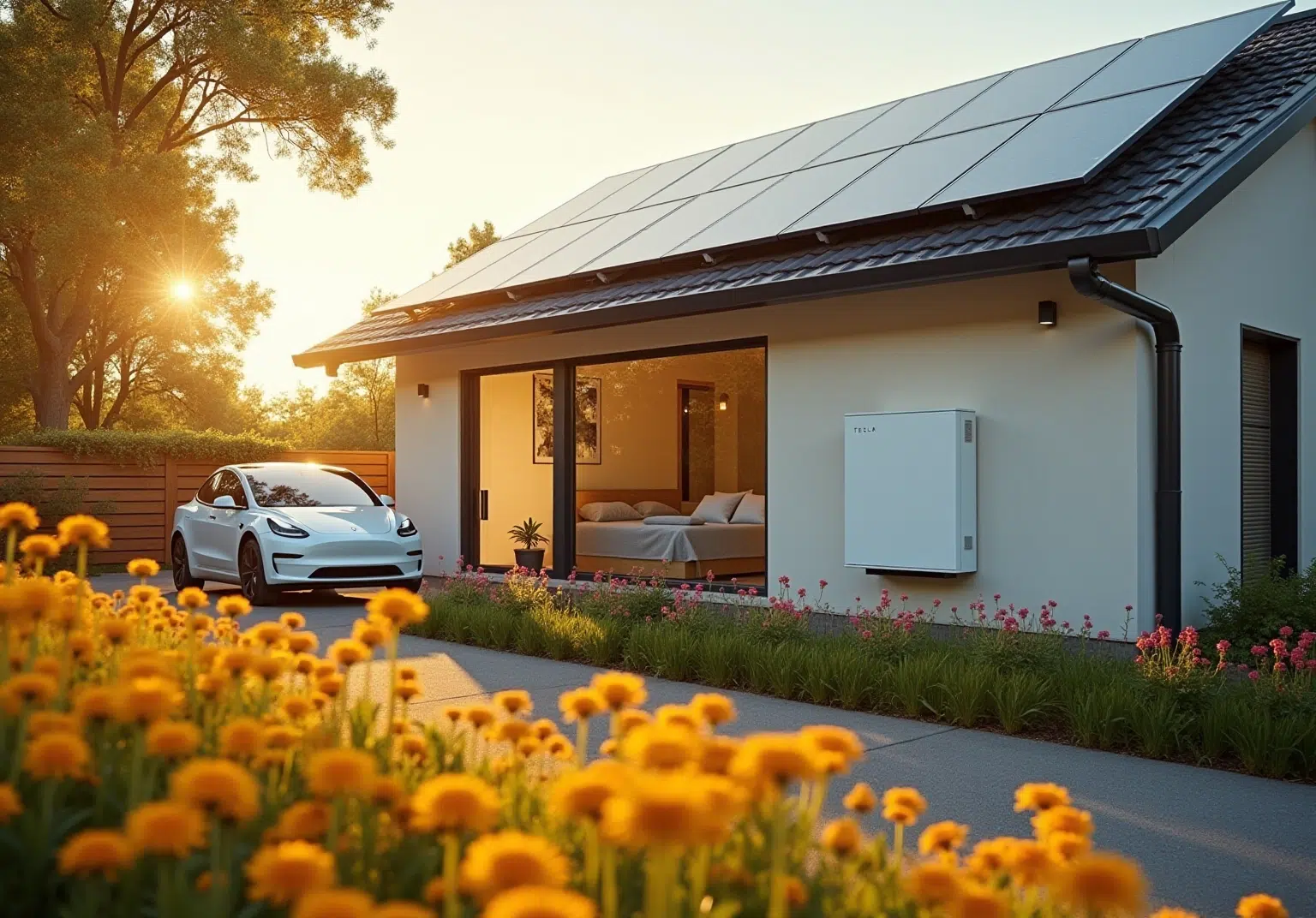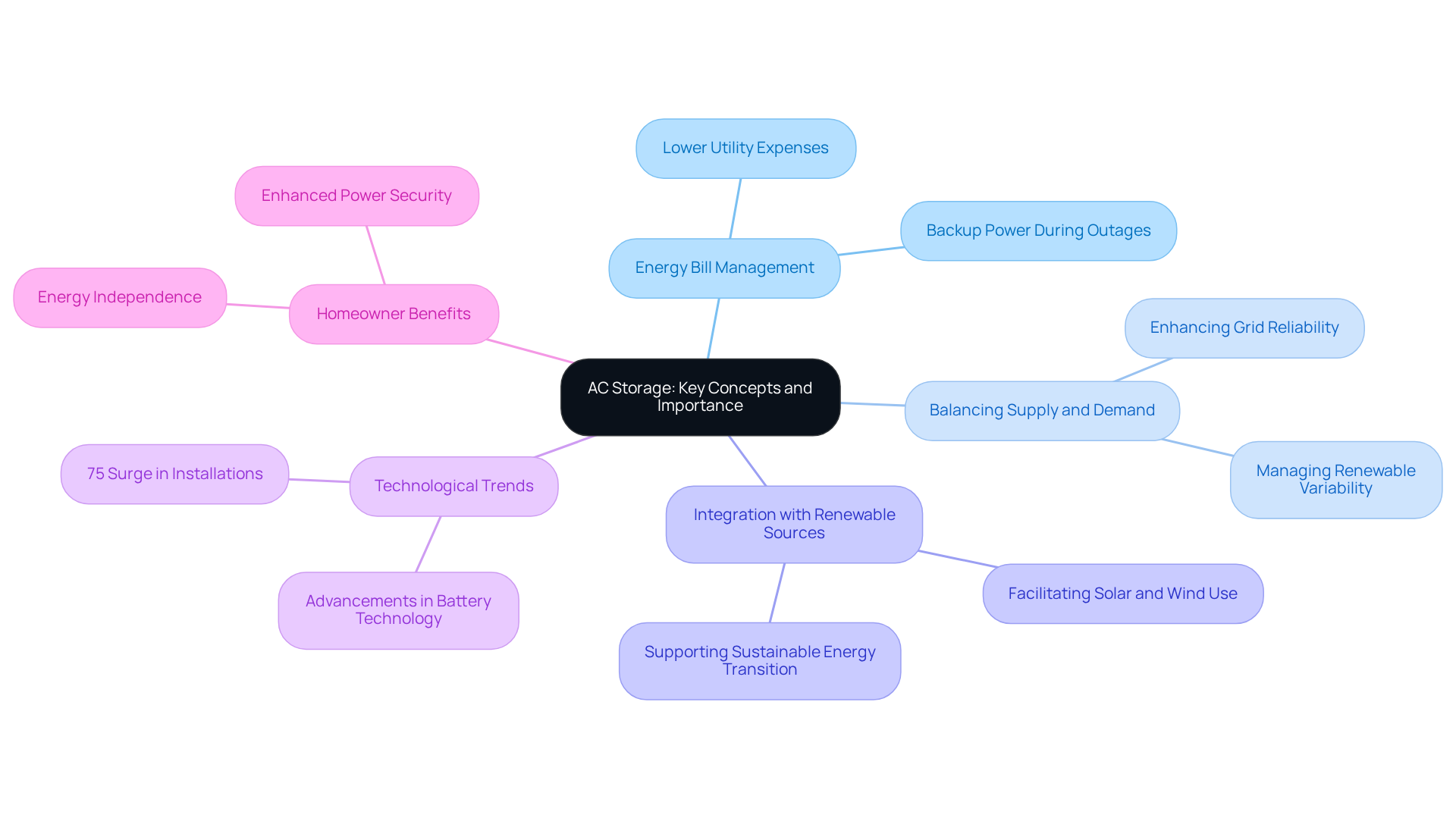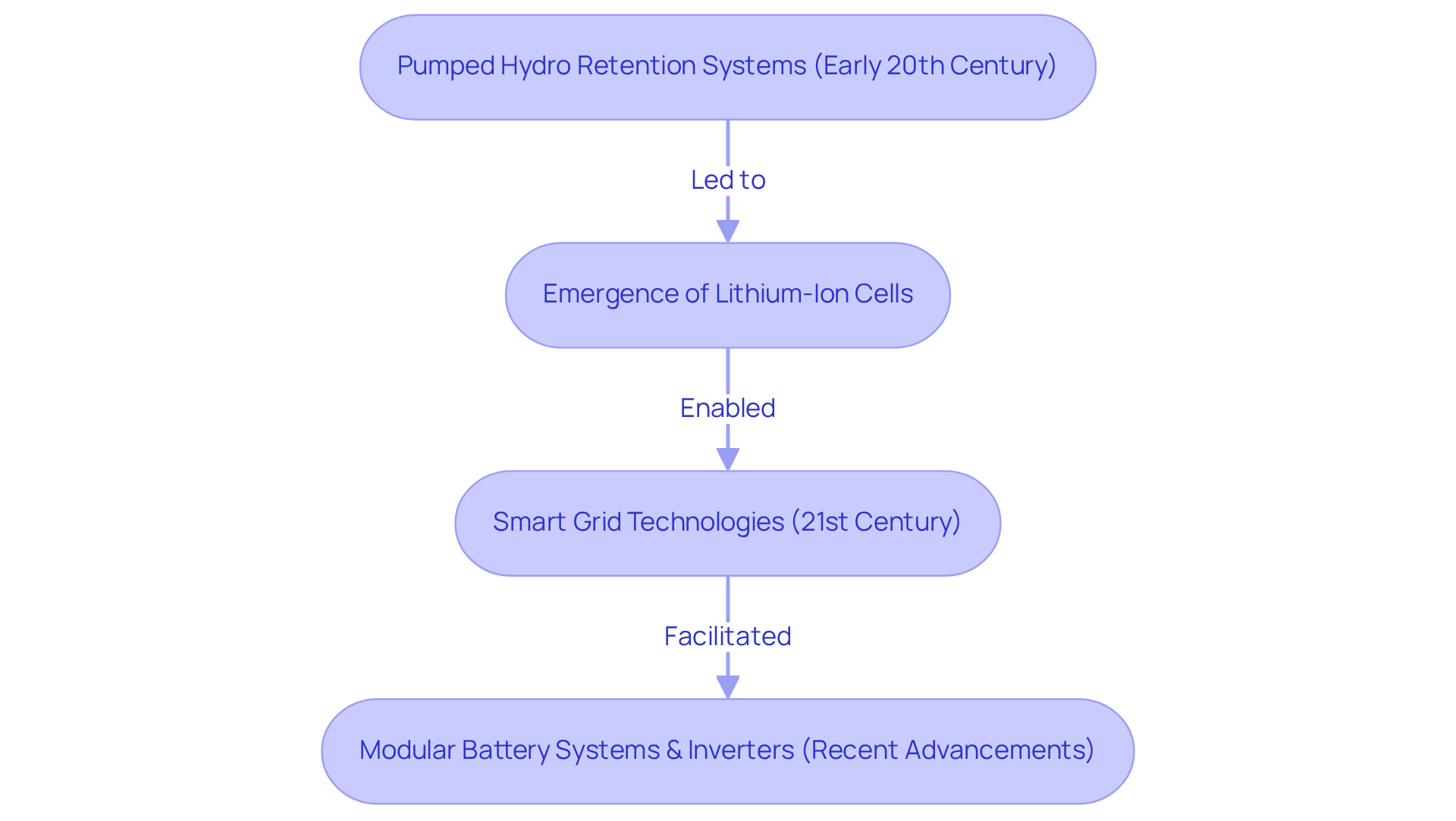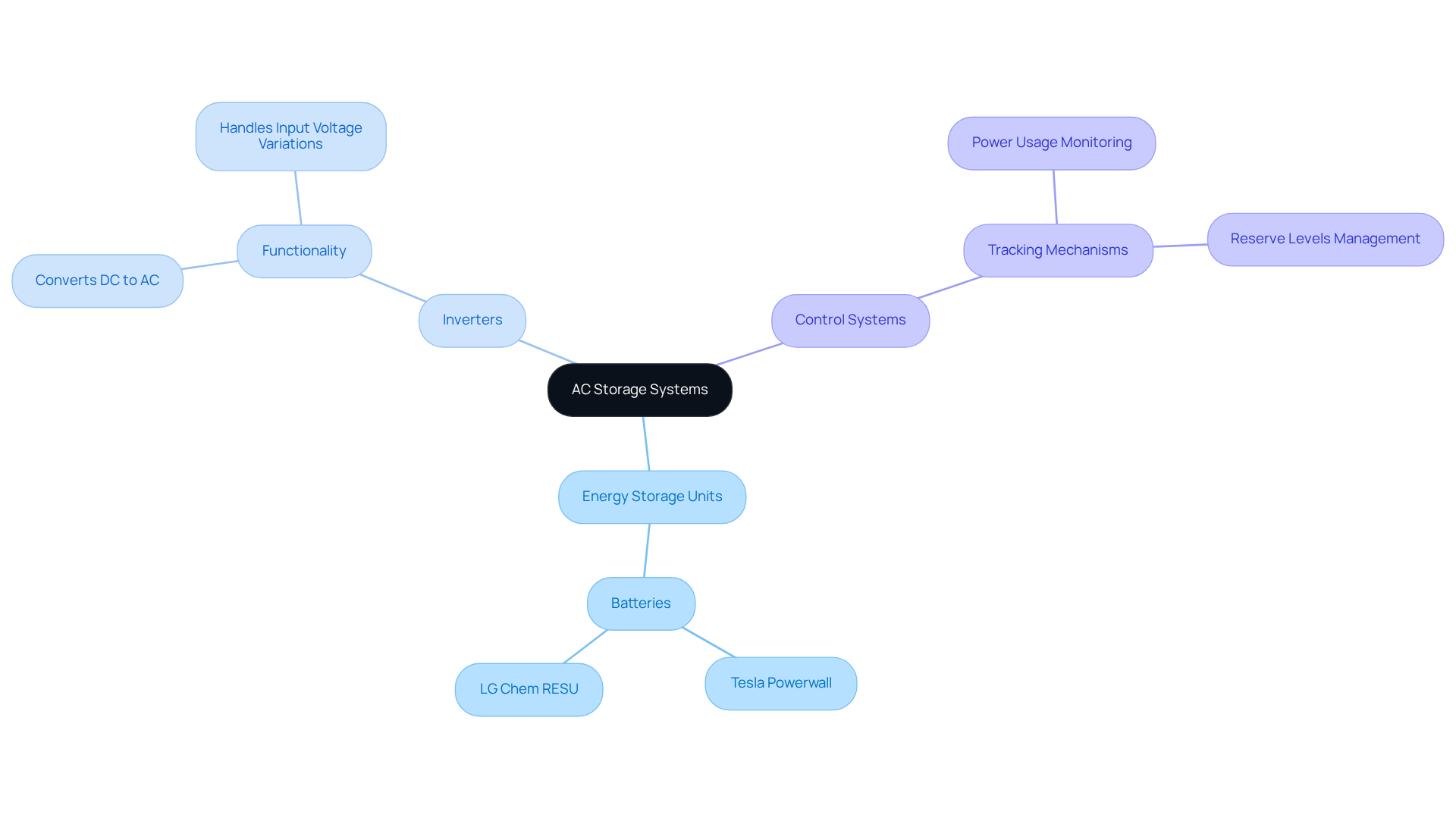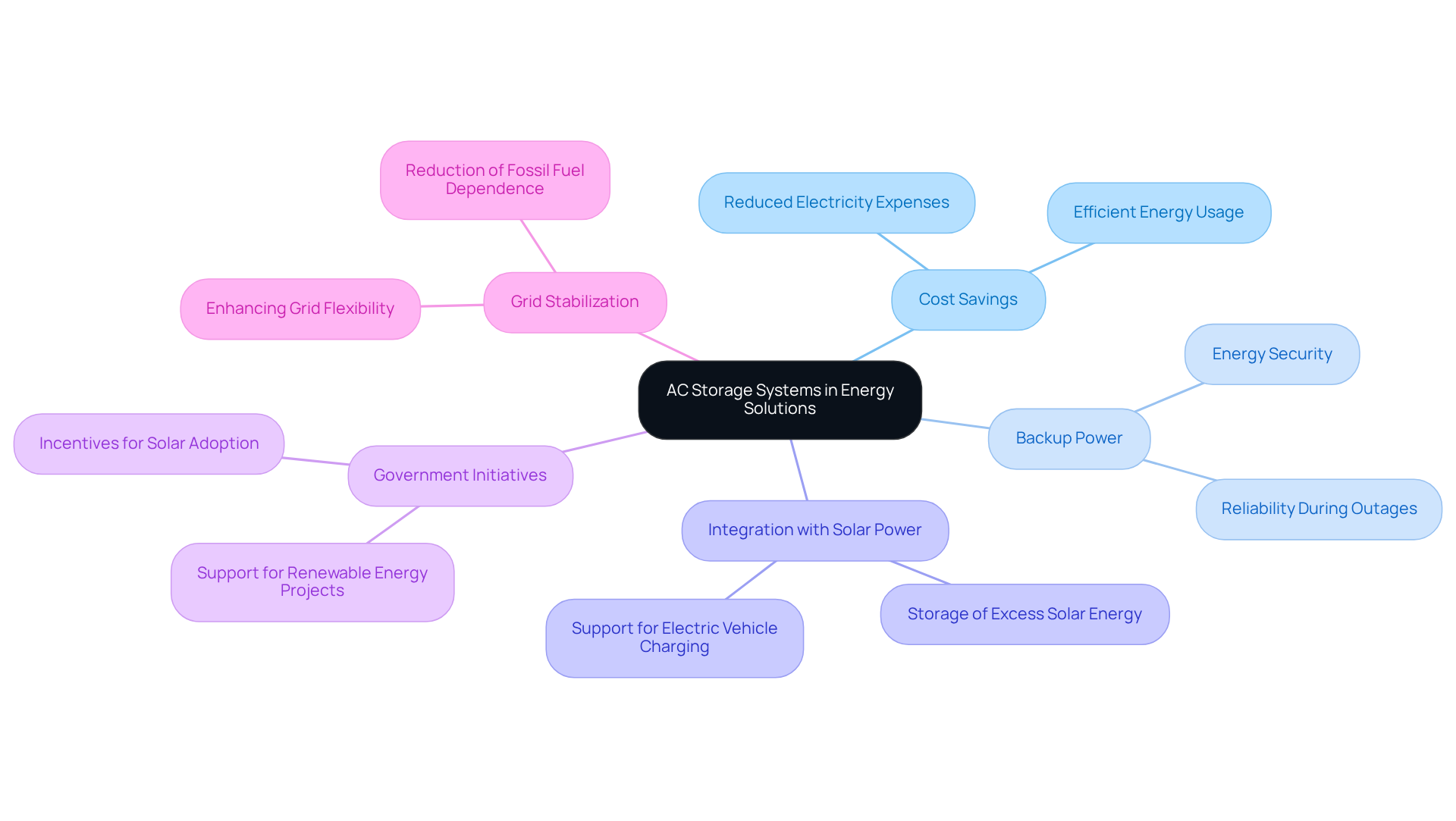Overview
We understand that managing energy consumption can be a significant concern for homeowners, especially with rising utility costs.
All AC storage is crucial for enhancing power reliability, particularly as renewable energy sources become more prominent in our lives.
Imagine being able to store surplus electricity, reducing your utility bills, and having backup power during outages.
AC storage systems provide these essential benefits, making them not just a luxury, but a vital component in our journey toward a sustainable energy future.
Together, we can embrace these solutions and work towards energy independence, ensuring a brighter and more reliable tomorrow for our homes and families.
Introduction
Understanding the intricacies of energy management is more critical than ever, especially as homeowners face the stress of rising utility bills and the unpredictability of energy supply. We recognize how overwhelming these challenges can be. All AC storage technology emerges as a pivotal solution, offering the ability to retain and utilize alternating current power effectively. This innovative system not only enhances energy independence but also addresses the challenges posed by integrating renewable energy sources.
How can we, as a community, leverage these advancements to not only lower costs but also secure a sustainable energy future together?
Define AC Storage: Key Concepts and Importance
We understand that managing energy bills can be a significant concern for many homeowners. All AC storage, which refers to alternating current retention, is a crucial technology that can help alleviate this worry by holding electrical power in the form of AC. This innovative framework plays a vital role in balancing supply and demand within electrical grids, especially as renewable power sources like solar and wind become increasingly important. By facilitating the effective use of produced power, AC containment systems empower users to retain surplus electricity for future use, greatly enhancing power reliability and sustainability.
It’s common to feel uncertain about the integration of renewable power into our daily lives. The inclusion of all AC storage reserves is essential for making this transition smoother. In fact, in 2022, grid-scale battery systems installations surged by over 75%, reaching nearly 28 GW. This trend underscores our growing dependence on such technologies to manage the variability of renewable sources. Not only does this assist in lowering utility expenses, but it also provides crucial backup power during outages, ensuring that homes stay powered even in challenging conditions.
Moreover, specialists emphasize that the advantages of all AC storage extend beyond mere power management. They highlight its importance in fostering independence and resilience, particularly for homeowners like you. By investing in systems for all AC storage, you can effectively reduce the impact of rising utility expenses and enhance your power security. As the demand for sustainable power continues to grow, the significance of all AC storage in enhancing grid efficiency and dependability becomes increasingly clear. Together, we can recognize this as an essential part of contemporary power solutions.
When considering the top solar battery choices for effective power retention, options like those provided by Tesla home chargers stand out. These setups not only offer reliable power retention but also integrate seamlessly with solar panel installations, illustrating the importance of all AC storage systems in ensuring power reliability. Let’s work towards a more sustainable future together, ensuring that your home remains a beacon of energy independence and security.
Trace the Evolution of AC Storage Technologies
We understand that many homeowners are concerned about rising energy bills and the impact of energy consumption on the environment. The evolution of AC retention technologies began in the early 20th century with the implementation of pumped hydro retention systems, which laid the groundwork for future advancements. Over the years, the emergence of lithium-ion cells has significantly transformed AC retention capabilities, allowing for greater energy densities and extended cycle lives. By 2023, the U.S. energy reserve market had surged to 17,380 MW, a remarkable increase from just 47 MW in 2010, showcasing the rapid adoption of these technologies.
It’s common to feel overwhelmed by energy costs, but the introduction of smart grid technologies in the 21st century has further improved the efficiency and dependability of AC reserves. Recent advancements, like modular battery systems and sophisticated inverters, enhance power flow, making AC retention more attainable and efficient for both residential and commercial uses. For example, Tesla’s Powerwall illustrates how lithium-ion technology can store surplus power produced from renewable sources, enabling homeowners to use clean power even during peak demand times.
These advancements position all AC storage as a vital element in the shift to a sustainable power future, addressing the increasing demand for dependable power solutions. As the need for effective power retention continues to rise, the advancement of all AC storage technology will be crucial in shaping the framework of AC retention solutions. Together, we can explore these solutions and work towards a more sustainable and energy-independent future.
Examine Components of AC Storage Systems
We understand that managing energy bills can be a significant concern for homeowners. All AC storage systems offer a thoughtful solution, comprising essential elements such as energy storage units, inverters, and control systems that work harmoniously to enhance your energy independence. Imagine the peace of mind that comes from knowing your home can harness energy efficiently. Batteries, like lithium-ion or lead-acid, play a crucial role by storing electrical power. Notable options in the market include:
- Tesla Powerwall – known for its sleek design and robust software integration
- LG Chem RESU – offers excellent performance and compatibility with various inverters
Inverters are the heart of this system, converting the stored DC power from the batteries into AC power, making it compatible with the electrical grid and your household appliances. Control mechanisms oversee the flow of power, ensuring that your setup functions efficiently and adapts to fluctuations in power demand. Furthermore, tracking mechanisms provide instant information on power usage and reserve levels, enabling you to enhance your power consumption habits.
Understanding these elements, along with the characteristics and specifications of top battery products, is essential for effectively applying all AC storage solutions in your home environment. Together, we can explore how these systems can not only reduce your energy costs but also empower you to take control of your energy future. Let’s work towards a more sustainable and independent energy solution for your home.
Explore Applications and Benefits of AC Storage in Energy Solutions
We understand that energy bills can be a source of stress for many homeowners. All AC storage systems provide a compassionate solution, especially for those utilizing residential solar power setups. By allowing you to store excess solar energy produced during the day, these systems empower you to use that energy during peak hours or at night, leading to significant decreases in your electricity expenses. Commonly found in average-sized homes, systems with capacities between 10 to 20 kWh effectively balance your energy usage and savings.
Moreover, AC reserve units serve as reliable backup power sources during outages, enhancing your overall power reliability. When combined with intelligent home technologies, they optimize your consumption, ultimately boosting your savings. With the rise of Tesla home chargers, integrating electric vehicle charging with your solar power system becomes effortless, maximizing resource utilization and retention.
As you explore the top solar battery options for effective power retention, it’s also beneficial to comprehend government solar panel initiatives that can support your renewable resource journey. Together, we can navigate these opportunities. As the adoption of renewable energy solutions increases, AC reserves play a vital role in stabilizing the grid, reducing reliance on fossil fuels, and fostering a sustainable energy future.
Real-world examples illustrate that homeowners utilizing all AC storage have successfully reduced their electricity costs. This showcases the tangible benefits of these innovative systems. Let’s work towards a more sustainable future together, where energy independence is within your reach.
Conclusion
As we navigate the journey towards energy independence and sustainability, all AC storage emerges as a pivotal technology that addresses our collective concerns about energy bills and the environment. By enabling the retention of alternating current, these systems help manage energy consumption effectively, reducing costs and enhancing reliability. With the increasing prevalence of renewable energy sources like solar and wind, the role of AC storage in balancing supply and demand within our electrical grids is becoming more essential than ever.
The article highlights several key aspects of AC storage that resonate with our shared experiences. From its historical evolution to essential components and practical applications, we see how far we’ve come. The transition from early pumped hydro systems to modern advancements in lithium-ion technology showcases significant transformations that have expanded the capabilities and accessibility of AC storage. The benefits of these systems extend beyond mere cost savings; they provide critical backup power during outages and facilitate the integration of renewable energy into our daily lives.
As the demand for sustainable energy solutions continues to rise, embracing all AC storage technologies is crucial for homeowners seeking to enhance their energy security and reduce their environmental impact. By investing in these systems, we can take proactive steps towards a more resilient and energy-efficient future. Remember, the journey towards energy independence is not just a personal endeavor; it is a collective movement towards a sustainable world where together we can harness the power of renewable energy.
Let’s work towards a brighter future, where every home can contribute to this important cause. We understand that making these changes can feel overwhelming, but with the right support and guidance, we can all play a part in creating a more sustainable and energy-efficient community.


